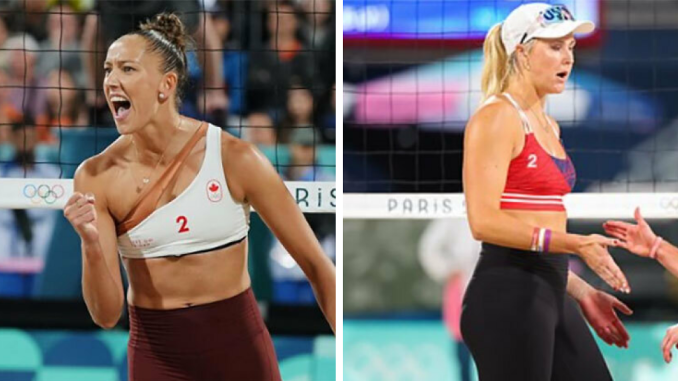
Sometimes, an athlete’s attire sparks as much conversation as the game itself. This is often the case in beach volleyball, where women have been competing in bikinis for decades.
However, due to the gloomy weather conditions in Paris on the first day of the 2024 Olympics, the women’s teams from Canada and the United States played in leggings and sports bras.
The game resulted in a victory for the American pair, Taryn Kloth and Kristen Nuss, over the Canadian duo, Heather Bansley and Sophie Bukovec.
Following the event, plenty of viewers were branded “sexist” for complaining about the absence of bikini bottoms on the women.
American and Canadian female beach volleyball competitors wore leggings instead of the traditional bikinis, sparking a debate about the athletes’ uniforms
Image credits: Sophie Bukovec
“Add it to the list of reasons as to why I’m not watching the Olympics,” wrote one viewer online.
“Every four years, I become a women’s beach volleyball enthusiast,” read another controversial comment.
“‘Leggings in beach volleyball is a crime,” another said.
Many others defended the women, writing, “Congratulations to the female athletes who fought so hard to be able to wear pants while they play beach volleyball.”
“It’s about time the women’s uniforms in volleyball matched the men’s…the most sexist outfits in all of the Olympics were in women’s beach volleyball,” somebody else penned.
Plenty of viewers were labeled as “sexist” for complaining about the absence of bikini bottoms on the women
Image credits: LSU Beach Volleyball
The following day, the teams from the United States and Canada returned to competition in 30C (86 F) weather wearing bikini uniforms. Australian players Mariafe del Solar and Taliqua Clancy have also sported bikini uniforms.
The International Olympic Committee had previously mandated all beach volleyball competitors must wear bikini uniforms, with rules establishing that the bottoms could not be more than 7 cm on the sides.
Those rules were discarded ahead of the 2012 London Olympics, with athletes now being allowed to compete in more modest uniforms.
Two pieces are still an option for women, but one-pieces and short-sleeve tops are also allowed. Full-length leggings and long-sleeve tops are also permitted in cold weather or for religious reasons, as per WWD. For instance, the Egyptian team competed with hijab uniforms.
The rules mandating that all female beach volleyball competitors wear bikini uniforms were discarded before the 2012 London Olympics
Image credits: Taliqua Clancy
“Many of these countries have religious and cultural requirements, so the uniform needed to be more flexible,” said Richard Baker, spokesman of the Fédération Internationale de Volleyball (FIVB) in 2012.
The FIVB, the sport’s governing body, requires that all uniforms have “a close fit.”
“Our suits need to fit just right so they don’t move places we don’t want them to move,” explained retired Olympic beach volleyball player Jennifer Kessy. “A tailored fit is key.”
Women’s briefs “should be cut on an upward angle towards the top of the leg,” while one-pieces “must closely fit and the design must be with open back and upper chest.”
As for male competitors, they wear tank tops and bottoms resembling board shorts. (The shorts can’t be longer than 3.9 inches above the knee). However, in many beach volleyball competitions outside of the Olympics, it’s common for men to play shirtless.
Egypt’s Doaa Tawfeek and Marwa Magdy competed in hijabs and uniforms that covered most of their arms and legs
Image credits: Doaa Tawfeek
Those who don’t comply with the FIVB’s uniform rules risk fines and penalties, possibly including disqualification.
While some viewers have called for more moderate uniforms, arguing that bikinis contribute to the sexualization of female athletes, several competitors choose to wear them because they find them the most comfortable option.
“Imagine diving chest first and lodging more sand than you care to think down the front of your suit. You can’t keep it in there, and it is not easy to get out,” said Kessy. When she wore a one-piece uniform, she found herself adjusting it all the time, which took her focus off the match.
“You’re not wearing more clothing in really hot weather; getting sand stuck in places is not fun,” said player Alix Klineman. “But I totally respect other people wanting to be more covered if that’s what makes them more comfortable.”
The post Viewers Branded “Sexist” After Complaining About Beach Volleyball Players Competing In Leggings first appeared on Bored Panda.
